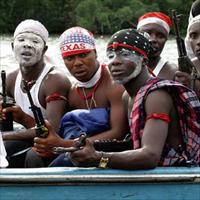CAMEROON-NIGERIA: Bakassi’s displaced in flux, peninsula vulnerable

A 18 October rebel attack on the Bakassi peninsula exposes the region’s continued vulnerability to “insurgency, piracy and unruliness,” according to a UN senior officer who coordinates the Cameroon Nigeria Mixed Commission that oversaw the handover of the peninsula from Nigerian to Cameroonian authorities on 14 August.
For decades, Cameroon and Nigeria had disputed ownership of the possibly resource-rich peninsula, taking their case to the UN International Court of Justice in 1994. After reviewing records going back one century, the court ruled the peninsula belonged to Cameroon.
On 20 October of this year, rebels calling themselves Bakassi Freedom Fighters and modelling themselves after the rebel Niger Delta Defence and Security Council (NDDSC) claimed an attack on a trawler in Cameroonian waters two days before.
Cameroonian defence authorities confirmed the attack, but dismissed it as piracy.
Simmering resentment
Whatever the motive for the attack, UN senior political affairs officer Jean Paul Vogels, coordinator of a UN commission in charge of demarcating a 1,800km disputed boundary between the two countries, told IRIN the incident is troubling. “We do not know who it is, but we know the consequences. This latest act of violence is not exclusive to Bakassi and highlights the general instability in the [Niger Delta] region. This is a threat that is being addressed by both Cameroon and Nigeria.”
NDDSC rebels based in Nigeria told Cameroonian media in July, shortly after killings of Cameroonian officials, that violence was their recourse to protest losing the peninsula to Cameroon.
Local media quoted rebel leader Ebi Dari: “Bakassi belongs to us…for both countries to have peace, both have to consult residents because some will be displaced…If they cannot contact these people, we won’t accept it.”
Who is affected?
Shortly after the peninsula’s handover, tens of thousands claiming to be from the Bakassi fled about 12km away into neighbouring Nigeria, with some accusing Cameroon officials of violence.
The UN’s Vogel said it has been a “nightmare” to determine how many are really displaced by the handover: “If you have visited the mangroves of Bakassi, you will see that there is no possible way 100,000 people could have even lived there.”
The 1,000sqkm peninsula has no roads, no schools, and only within the past two years has the French military started setting up health facilities in the swampland inhabited by mostly fishermen.
Vogels told IRIN the numbers of displaced reported in local media do not necessarily represent people who fled violence on the peninsula. “People who said they are from Bakassi may have come from other parts of Cameroon and Nigeria that historically at one point was a part of Bakassi, and while historically correct, the contemporary outline of Bakassi is different; people [in Cameroon] may have thought they could qualify for housing they heard Nigerian authorities were reserving for the displaced, or Nigerian authorities themselves report higher numbers in an effort to get more funding from the federal government.”
On the move
But chairman of the Mbo local government council in Akwa Ibom state in Nigeria, Victor Antai, told IRIN his council has registered about 75,000 Bakassi displaced: “Anyone disputing our figures can come and check. We don’t hide anything; our doors and books are wide open to anyone wishing to crosscheck the number of returnees we are hosting. What is happening is that after hanging around for weeks without help from the federal government, most of the returnees have resumed their fishing activities. They can’t just sit down like that. Most of them are back to fishing and others are trying to make a living doing menial jobs in neighbouring communities. So that may explain why you may not see all 75,000 registered returnees gathered in one place.”
He said some displaced may be choosing to go back to Bakassi for reasons of livelihood. “It is all about survival. If they feel they are better off in Bakassi then of course they will go back. But I think everyone is adopting a wait-and-see attitude here. Since there hasn’t been much help from Nigeria then you would expect that they may wish to go back to Bakassi, even if they have security concerns.”
The Nigerian National Boundary Commission has pledged more than US$7 million in federal funds to resettle Nigerian nationals into the Cross River state, next door to Akwa Ibom.
The UN’s Vogels told IRIN Cameroonian officials have known since 2006 they needed to improve infrastructure in the peninsula in preparation for the official handover, but now the peninsula is under their control, the pressure is even more intense. “There is little civil administration [in Bakassi]. Some people do not have identity cards, which makes schooling impossible. It will be three times as expensive to develop anything in the peninsula because it is a mangrove. They are under pressure to do this quickly to secure the area. Bakassi has been so neglected, and now the Cameroonian government is working to show it can make a visible difference.”
See Also
- DRC: International Court takes second ex-rebel commander into custody over war crimes
- Armed aid convoys are an inadequate bandage for DR Congo's deep wounds
- Court sentences eight to death in Sudan over Omdurman rebel attack
- Mob attack on church in Kenya leaves 30 dead
- DR Congo: Civilians under attack need urgent protection
 Back and Next - Back and Next
Back and Next - Back and Next See Also - See Also
See Also - See Also